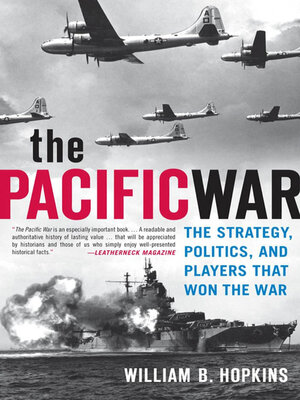
Sign up to save your library
With an OverDrive account, you can save your favorite libraries for at-a-glance information about availability. Find out more about OverDrive accounts.
Find this title in Libby, the library reading app by OverDrive.



Search for a digital library with this title
Title found at these libraries:
| Library Name | Distance |
|---|---|
| Loading... |
This "important comprehensive study" of WWII in the Pacific examines the high-level decision-making and strategy that led to victory (Roanoke Times).
Once the stories have been told of battles won and lost, most of what happens in a war remains a mystery. So it has been with accounts of World War II in the Pacific, a complex conflict whose nature is often obscured by simple chronological narratives. In The Pacific War, William B. Hopkins, a Marine Corps veteran of the Pacific war and respected military history author, opens the story of the Pacific campaign to a broader and deeper view.
Hopkins investigates the strategies, politics, and personalities that shaped the fighting. His regional approach to this complex war conducted on land, sea, and air offers an insightful perspective on how this multifaceted conflict unfolded. As expansive as the immense reaches of the Pacific, and as focused as the most intensive pinpoint attack on a strategic island, Hopkins' account offers a fresh way of understanding the hows—and more significantly, the whys—of the Pacific War.
Once the stories have been told of battles won and lost, most of what happens in a war remains a mystery. So it has been with accounts of World War II in the Pacific, a complex conflict whose nature is often obscured by simple chronological narratives. In The Pacific War, William B. Hopkins, a Marine Corps veteran of the Pacific war and respected military history author, opens the story of the Pacific campaign to a broader and deeper view.
Hopkins investigates the strategies, politics, and personalities that shaped the fighting. His regional approach to this complex war conducted on land, sea, and air offers an insightful perspective on how this multifaceted conflict unfolded. As expansive as the immense reaches of the Pacific, and as focused as the most intensive pinpoint attack on a strategic island, Hopkins' account offers a fresh way of understanding the hows—and more significantly, the whys—of the Pacific War.







